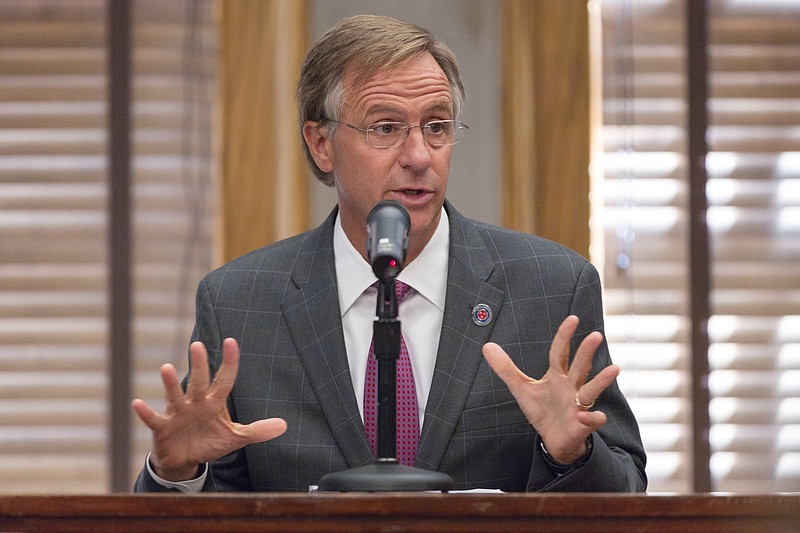NASHVILLE - State officials say their controversial real estate management outsourcing contract with Jones Lang LaSalle resulted in $12.9 million in "cost avoidance" to Tennessee government during its first two years.
General Services Deputy Commissioner John Hull cited the savings by real estate management giant Jones Lang LaSalle, basing the figure on the department's $36.9 million projections on what the state would have spent annually had it continued doing the work itself.
But despite being asked repeatedly by reporters to point to Fiscal Year 2013 budget figures or other data supporting the assertion, Hull did not.
He acknowledged it was not a direct "apples to apples" comparison because Jones Long LaSalle is doing things such as preventive maintenance, an issue ignored for decades by previous administrations until Republican Gov. Bill Haslam initiated the privatization venture.
"The previous philosophy is 'we'll fix things after they're broken,'" explained Hull, who also heads the State of Tennessee Real Estate Asset Management Division. "We're going to do more preventative maintenance of managing buildings."
The meeting with reporters came in advance of a planned presentation next week before the General Assembly's Fiscal Review Committee, a watchdog oversight panel.
And it also comes as Haslam and his administration seek to make the case for privatizing facilities and energy management for almost all state buildings, including higher education, state parks, National Guard armories and even prisons.
Right now, JLL is managing only about 10 percent of state office space. State employees, a higher education union and Democratic lawmakers say Haslam's plan will result in workers being paid less in a state with one of the highest percentages of minimum wage workers in the nation.
The governor himself ran headlong into that sentiment earlier this week in Murfreesboro. Anne Barnett, a representative of United Food & Commercial Workers Union Local 1995, asked him why he is bent on outsourcing to a "private company for private profit."
"They are actually saving the state a lot of money," Haslam said of JLL to Barnett, who was accompanied by another dozen union members.
Barnett said, "I disagree with trying to make money off the backs off the lowest-wage workers" by cutting wages and benefits.
Haslam argued "the people who work for JLL are making more than when they worked for the state" to which Barnett countered, "I don't believe that at all," noting when she worked at the University of Tennessee, officials outsourced food services to a private firm which cut benefits for workers.
The university eventually went back to providing the services in-house but that could change under what the administration is now examining.
Meanwhile, General Services estimates the remaining buildings and facilities have deferred maintenance costs of $4 billion, although administration officials did not provide specific figures Thursday.
Hull said General Services' benchmark estimate of the costs was $36.9 million and JLL beat that the very first year by $5.55 million.
"We thought that was a very good number because we knew the state had a lot of work to do. We needed JLL or someone to come in and fix all those things," he said.
But JLL had claimed they would save the state $50 million over the life of its original five-year contract. Two years into the contract, it's $12.9 million.
The estimated $12.9 million in "cumulative cost avoidance" by JLL outlined by officials on Thursday was based on JLL operations for two years, Fiscal Year 2014 and Fiscal Year 2015. That comes in two areas: facilities management and energy/utilities.
In FY 2014, Hull said, there were $4.97 million in "cost avoidance" in facilities management operations and another $580,000 for energy. That generated a total of $5.55 million in savings, the department says.
"They were able to do that for $5 million less in the very first year," Hull said.
In the FY 2015 fiscal year that ended June 30, those same savings re-materialized and are included in second-year cost-saving estimates. That plus some additional savings, Hull said. So far, he noted, in facilities management operations the savings were $5.82 million - $850,000 more than the first year. Energy savings were pegged at $1.55 million, almost $1 million more than last year.
So the total, by administration reckoning, was $7.37 million in the second year.
Officials say that's due to JLL's better-trained staff "self-performing" the work instead of having subcontractors do work on many relatively routine maintenance items, reduced utility expenses and preventive maintenance and better subcontractor pricing.
Asked about JLL's assertions that it could save the state $50 million over the life of the five-year contract, Hull said, "that's not correct. They never promised it. When that estimate was made, actually JLL made the estimate, at that point they did not have the assessment and the condition of these buildings."
The state had provided the company with the best information officials had, he said.
The current contract covers several state-owned office buildings in Nashville and across the state. The company is paid a $600,000 administrative fee. But JLL also handles leased office space now for which it receives a 4 percent commission on each lease struck.
In Chattanooga, JLL said it would be too costly to repair two state office buildings and recommended the state sell them and build new ones. But the state chose to go a different course, gave the buildings to UT-Chattanooga and used JLL to lease space elsewhere with the company getting a 4 percent commission.
Contact Andy Sher at asher@timesfreepress.com, 615-255-0550 or via twitter at AndySher1.
